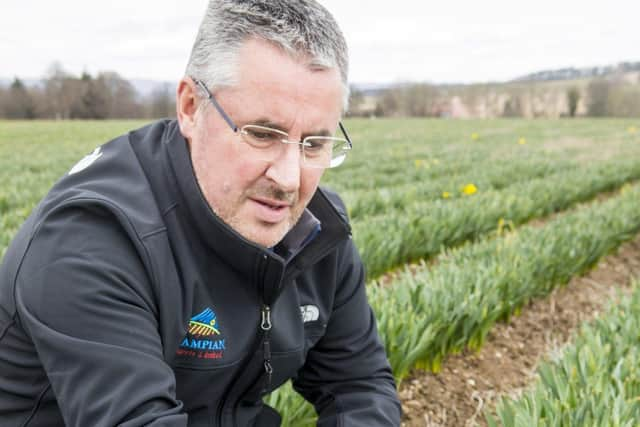Scotland's daffodil farmers set for second harvest disaster with Covid restrictions lifting too late


Last year, a group of 12 growers in the northeast had to watch at least 75 per cent of their crop worth up to about £1 million rot in fields as the pandemic hit right over the industry’s prime harvest time.
Bunches of daffodils were chucked in their millions in what farmers have called “a harvest disaster” as seasonal workers were unable to travel to the farms.
Advertisement
Hide AdAdvertisement
Hide AdThis year, with restrictions on travel and accommodation not lifting until after 26 April – one month too late – and a limited number of foreign workers coming to the UK in the wake of Brexit, the fate of 2021’s harvest isn’t looking much better.


Mark Clark, of Grampian Growers (GG), a farmer-owned cooperative based near Montrose, described the current situation as “galling”.
He said the demand for flowers is growing, but there aren’t enough hands to pick them.
“Flowers aren’t considered essential, so with Covid restrictions still in place, we are not getting the labour force we need,” he said.
“At this stage we are about 60 percent down on the amount of workers, which means we will lose 60 percent of our crop.”
During the six to eight week picking season, the cooperative historically welcomes about 270 workers.
But most of the pickers rely on nearby caravan parks for accommodation which won’t open until 26 April.
“Across the farms we only have bed space for 40 percent of the squad than we usually get,” Mr Clark added.
Advertisement
Hide AdAdvertisement
Hide AdAnother concern is the fear that the pickers won’t come at all.
Growers do not have the same derogation as fruit producers who can fly in workers from abroad to quarantine on farms, so they have to rely on UK pickers who work in Cornwall and Lincolnshire.
These seasonal pickers usually migrate north when the season ends in the south but this year English farms are 25 per cent short of their usual picking contingent so they are expected to hold on to staff for longer than usual.
“In Cornwall a big grower might have 700 pickers,” Mr Clark added, “but this year they’re down to around 450, and one of my worries is that those big farms will probably need them for a greater number of weeks to complete season before some come north.
“The losses last year were devastating and with the serious lack of pickers predicted to come this year, it’s going to be another struggle.”
Kym McWilliam runs NJ McWilliam & Co near Laurencekirk with her family.
Normally in March she would be expecting about 80 people to pick the farm’s daffodil fields, but this year she said the maximum number of workers who she can accommodate on her farm is about 36 - if they come at all.
“Last year was nothing but a disaster,” she said.
“We normally pick somewhere between 800,000 and 1.6million bunches, but in March 2020 we got about 200, at most.”
Advertisement
Hide AdAdvertisement
Hide AdShe said she fears backlash from the locals this year over welcoming pickers back into the community and asking the public to avoid walking on her farmland as she attempts to make up for last year’s losses.
A message from the Editor:
Thank you for reading this article. We're more reliant on your support than ever as the shift in consumer habits brought about by Coronavirus impacts our advertisers.
If you haven't already, please consider supporting our trusted, fact-checked journalism by taking out a digital subscription.
Comments
Want to join the conversation? Please or to comment on this article.